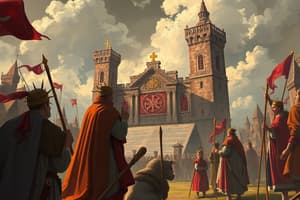Podcast
Questions and Answers
Who was one of the first countries in Europe to develop a central monarchy?
Who was one of the first countries in Europe to develop a central monarchy?
Who cut the Vikings' conquering of England short?
Who cut the Vikings' conquering of England short?
Who became the new king after Alfred the Great died?
Who became the new king after Alfred the Great died?
What book contained the survey results gathered in England during William's reign?
What book contained the survey results gathered in England during William's reign?
Signup and view all the answers
Which king after William gained even more power by gaining land in France?
Which king after William gained even more power by gaining land in France?
Signup and view all the answers
Who did Henry, William's great grandson, marry?
Who did Henry, William's great grandson, marry?
Signup and view all the answers
What was the main purpose of the Magna Carta?
What was the main purpose of the Magna Carta?
Signup and view all the answers
What was the role of the Parliament in England according to King Edward I?
What was the role of the Parliament in England according to King Edward I?
Signup and view all the answers
What was the territory ruled by the kings of France after Charlemagne?
What was the territory ruled by the kings of France after Charlemagne?
Signup and view all the answers
Why was Otto the Great rewarded by being made emperor of the Romans?
Why was Otto the Great rewarded by being made emperor of the Romans?
Signup and view all the answers
What did Henry and his wife rule?
What did Henry and his wife rule?
Signup and view all the answers
What was a significant outcome of King John's loss of English territory in France?
What was a significant outcome of King John's loss of English territory in France?
Signup and view all the answers
What did Hugh Capet do to extend the power of his monarchy through France?
What did Hugh Capet do to extend the power of his monarchy through France?
Signup and view all the answers
What distinguished Germany from France in terms of political administration?
What distinguished Germany from France in terms of political administration?
Signup and view all the answers
What was a key characteristic of the Holy Roman Empire under Otto the Great?
What was a key characteristic of the Holy Roman Empire under Otto the Great?
Signup and view all the answers
What led to the formation of Parliament in England?
What led to the formation of Parliament in England?
Signup and view all the answers
Study Notes
- Layla Geoshy's outline from September 26, 2023, discusses the growth of monarchies with a focus on the English monarchy.
- Anglo-saxon England: Descendants of the Anglo-Saxons invaders ruled England during this period, with Europe divided into 7 small kingdoms.
- Anglo-Saxon period: Alfred the Great halted Viking conquests, but after his death, both Harold, an Anglo-Saxon nobleman, and William, Duke of Normandy, claimed the English crown.
- Norman Conquest: Harold became the new king, but William, angered by being denied the crown, sent an army and won the battle, claiming the land of England as his own.
- Nobles received land as fiefs and pledged loyalty to the king. William demanded a survey for more knowledge about the kingdom, leading to the creation of the Domesday Book, and brought French culture to England.
- The English monarchy gained power by acquiring French territory, making English kings vassals of the king of France, and ruling half of France.
- King John raised taxes for wars, leading to the Magna Carta's creation in 1215. This document limited the king's power by requiring his permission before taxes and proper procedures before arrests.
- The Parliament formed to create new taxes, advise the king on law making and royal policies. Edward I clarified the role of the Parliament, making it a significant council in England's lawmaking.
- The French monarchy developed more slowly, with kings having limited territory and powerful nobles, including the English, ignoring their wishes.
- The Capetian monarchy rose to power in France, with Hugh Capet being the first family member to secure the throne. They owned most of modern France, but sometimes fought or allied with local nobles.
- In Europe, Charlemagne united western Europe, with the eastern part becoming Germany, the western part becoming France. Germany had more small states, and Otto the Great, the Duke of Saxony, became the king of the Germans with the people's support, conquering parts of Italy and gaining the title of Holy Roman Emperor.
- The Holy Roman Empire was the land united under Otto, receiving the pope's support. The Holy Roman emperors made decisions with the help of ruling dukes and were chosen through elections.
- The text also mentions Spain and Portugal, but details are not provided.
Studying That Suits You
Use AI to generate personalized quizzes and flashcards to suit your learning preferences.
Description
This quiz outlines the growth of monarchies with a focus on the English Monarchy, including the Anglo-Saxon period, Alfred the Great, and the Norman Conquest. It covers key developments and rulers in early English history.




